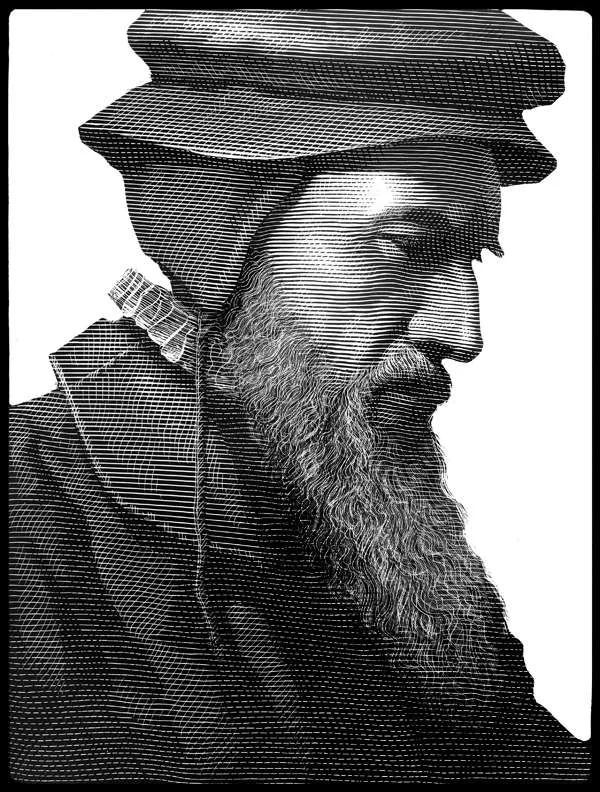
To listen to today’s reflection as a podcast, click here
Each day this Lent we’re looking at major “turning points” in Christian history – moments or seasons in which the story of God’s people took an important and often unexpected turn.
No luminary in the history of Christianity has been saddled with a worse reputation than John Calvin.
For the last 500 years, Catholics and Protestants alike have portrayed him as a cold, unbending, ruthless fanatic. Portraits of Calvin, like the one above, seem to scream, “This is what the Grinch would look like if he became a 16th century reformer.”
In 1971, historian Richard Stauffer even wrote a book called The Humanness of John Calvin, as if the world needed evidence that he was not actually an extraterrestrial sent to muddle our brains with theological formulations.
Then we read passages like this one: “There is not one blade of grass, there is no color in this world that is not intended to make us rejoice.”
Calvin wrote that. He also cultivated a pastor’s heart, enjoyed the company of other people, and even went bowling on Sunday afternoons.
No one disputes he had a first-rate intellect. Trained as a lawyer, he applied the full arsenal of his analytical resources to his faith after he experienced a “sudden conversion” to the teachings of the reformers in his early 20s.
In 1536, Calvin published the first edition of The Institutes of the Christian Religion, a four-volume masterwork that displayed his grasp of Greek, Hebrew, Latin, and Aramaic. No theological question of any substance escaped his pen. He was only 27 years old.
Calvin spent the rest of his life updating and enlarging the Institutes. It became the most celebrated early summary of Protestant teachings.
In addition, Calvinism, in the history of Christianity, is one of the very few modes of thought that can truthfully be called a systematic theology.
My own heritage has Calvinist foundations. When I introduce myself as a Presbyterian, it’s not unusual for someone to say, “So, you believe in predestination, huh?” Even though predestination plays just a small role in the Institutes and doesn’t appear until Volume III, Calvin has long been associated with it.
What exactly are we talking about?
Predestination is the Bible’s teaching that the final spiritual destiny of every human being is decided by God not only before that person dies, but before that person is born. That’s because salvation is God’s business, not ours. We don’t choose God. God chooses us. Predestination declares that despite all our wishes to the contrary, we are never in control when it comes to God. We cannot have a desire for God that is not surpassed by his desire for us. And we cannot have a desire for God that he did not in fact put there himself.
In case you’re wondering, “Who in the world could ever believe such an unfair and unjust doctrine?” you might be surprised to learn that the previous paragraph is consistent with the teaching of virtually every Christian body in existence.
But then we come to a fork in the road. On what basis does God make such choices? Here is where different groups cling to different answers.
Catholics traditionally believe that all human beings retain at least a tiny power to choose salvation for themselves. Just desiring God and wanting to be a good person are credited to our account. On the basis of both his grace and our merit, God grants salvation. Most Methodists, Baptists and Pentecostals would agree.
The major figures of the Protestant Reformation, including both Luther and Calvin, strongly disagreed. They insisted that spiritually dead people (as the apostle Paul labels us in Ephesians 2:1) are really and truly spiritually dead. And dead people cannot resurrect themselves and go looking for God.
God is the one who graciously plants within us a desire for his company, as well as the capacity to believe.
Shining the spotlight on God’s “sovereignty” – his absolute oversight of every aspect of the cosmos – is perhaps Calvin’s most famous contribution to the development of Christian thought. It’s an emphasis that is getting less and less attention in American congregations these days, since personal autonomy – “I’m in charge of my own life, and I get to have the last word on everything” – has now become as American as apple pie.
Calvin was a scholar par excellence. In his church in Geneva, Switzerland, he often preached three times a day. He wrote a commentary on 65 of the Bible’s 66 books. The only exception was Revelation. Even the greatest Christian mind of the last half millennium figured he would probably get himself into trouble by tackling the Bible’s most controversial book.
Many are surprised to learn that Calvin threw himself into the goal of transforming the city of Geneva into something resembling the kingdom of God on earth.
It wasn’t easy.
Geneva was a notorious party town. Few people welcomed the efforts of some Bible thumper to regulate schools, businesses, and even relationships.
The Scottish reformer John Knox, a devoted disciple of Calvin, was impressed. In his opinion, Geneva became “the most perfect school of Christ since the days of the apostles.”
Others weren’t so sure. From time to time, Calvin’s zeal overtook his compassion. He definitely made some mistakes – at least one of which we’ll tackle in a future reflection. It’s safe to say that no one – not the most committed women and men in the long story of Christ’s followers on earth – have been able to bring about the perfect world they so yearned to see.
Nonetheless, this one man’s legacy is secure.
So, look past the grim face.
Whenever you gaze at John Calvin, you’re seeing someone whose “all-in” scholarship and devotion to God undeniably changed the course of Western history.
